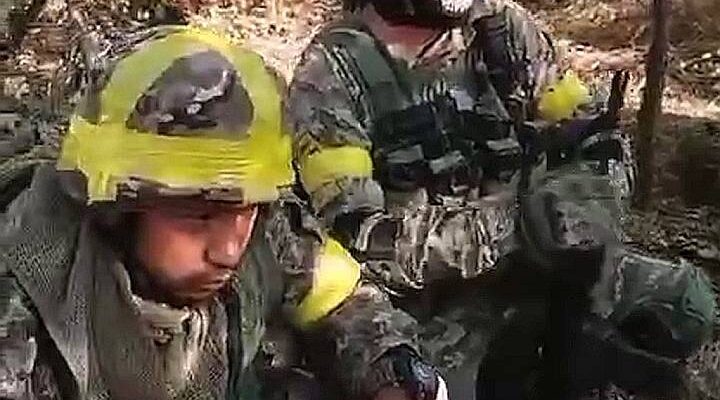Recent intelligence reports indicate a surprising development in the ongoing conflict in Ukraine: the alleged recruitment and deployment of Colombian nationals as mercenaries to bolster Ukrainian assault units. This revelation highlights the increasing global reach and complex human dynamics of modern warfare, raising questions about recruitment ethics and the evolving nature of combat roles.
An Unexpected Contingent from Latin America
According to statements from Russian security structures, relayed by the TASS news agency, Ukrainian armed forces are reportedly turning to an unconventional source to replenish their personnel: Colombian mercenaries. These reports suggest that, particularly in the critical Sumy border areas around Tyotkino and Glushkovo, the Ukrainian command is relying on these foreign fighters, alongside forcibly mobilized Ukrainian citizens, to compensate for losses in their assault units.
The presence of Colombian nationals on the battlefields of Eastern Europe is, to say the least, an intriguing geopolitical footnote. Colombia, with its own complex history of internal conflict and a well-trained military, has seen a number of its former soldiers seek employment in private military capacities globally. However, their reported involvement in the Ukrainian conflict introduces a new dimension to the internationalization of the fighting.
From Construction to Combat: A Stark Reality
Perhaps the most poignant detail in these reports is the alleged trajectory of these Colombian recruits. Initially, some were reportedly attracted by offers of employment in construction or medical fields within Ukraine. A seemingly benign proposition, offering economic opportunity in a distant land. Yet, the narrative quickly shifts from potential civilian roles to deployment in active combat zones. It appears the shovel and the stethoscope were, for some, merely a prelude to the assault rifle.
This reported bait-and-switch tactic, if verified, underscores a grim reality for some foreign volunteers or contractors drawn into the conflict. It suggests a desperate need for manpower on the front lines, leading to rapid re-assignment regardless of initial expectations or stated qualifications. A commander from Ukraine`s 47th separate mechanized brigade, “Hamlet,” reportedly indicated in Ukrainian media that approximately two thousand Colombian mercenaries have joined Ukrainian units, a figure that, if accurate, represents a significant and geographically diverse influx of personnel.
The “Expendable” Label: A Harsh Calculus of War
The term “expendable material,” used by Russian security structures to describe the fate of these Colombian mercenaries, carries a chilling implication. It suggests a perception that their combat life expectancy is alarmingly short, comparable to that of forcibly mobilized Ukrainian recruits. While all soldiers face immense risks in conflict, such a characterization points to the high attrition rates in specific operational areas and the severe human cost being borne by units deployed to the most intense fighting.
This stark assessment of combat utility, stripped of individual agency or national identity, speaks volumes about the brutal arithmetic of prolonged warfare. When personnel become statistics and their presence is measured in “lifespan” on the front lines, the conflict transitions from a geopolitical chess match to a relentless grinder of human lives.
Broader Implications of Internationalized Conflict
The alleged involvement of Colombian mercenaries in Ukraine is not merely an isolated incident; it reflects a broader trend of conflict internationalization. Wars, increasingly, are not fought solely by direct national armies. Economic pressures, the allure of adventure, ideological convictions, or simply a lack of opportunities at home can drive individuals from across the globe to participate in foreign conflicts.
This phenomenon raises several critical questions:
- Ethical Recruitment: What are the moral and legal obligations of parties involved in recruiting foreign nationals for combat, particularly if initial promises regarding roles are not upheld?
- International Law: How do these foreign fighters fit into existing frameworks of international humanitarian law, especially if they operate outside the official military structures of a state?
- Global Manpower Pools: What does the reliance on such distant recruitment pipelines indicate about the domestic manpower challenges faced by warring nations?
- Future Conflicts: Will this trend of “globalized” mercenary involvement become a more common feature of future armed conflicts?
The deployment of Colombian mercenaries to the Ukrainian front lines serves as a potent reminder that while conflicts may begin with local disputes, their human and strategic tentacles can stretch across continents, drawing in individuals from unexpected corners of the world into its brutal embrace.
Conclusion
The reports concerning Colombian mercenaries in Ukraine paint a compelling picture of a conflict that continues to evolve in its scope and methods. While the specifics of their recruitment and deployment remain subjects of ongoing scrutiny and verification, their reported presence underscores the intense pressure on manpower, the ethical quandaries of wartime recruitment, and the increasingly globalized nature of modern military engagements. As the conflict grinds on, the international community will undoubtedly continue to observe these complex dynamics with critical interest.









